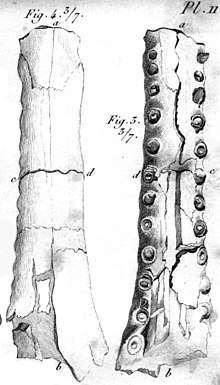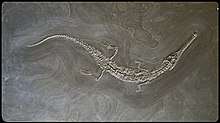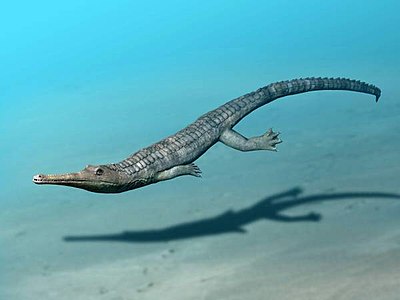Steneosaurus
Steneosaurus is a dubious genus of teleosaurid crocodyliform from the Middle or Late Jurassic (Callovian or early Oxfordian) of France. The genus has been used as a wastebasket taxon for thalattosuchian fossils for over two centuries, and almost all known historical species of teleosauroid have been included within it at one point. The genus has remained a wastebasket, with numerous species still included under the label ‘Steneosaurus’, many of which are unrelated to each other (either paraphyletic or polyphyletic with respect to each other and other genera of teleosauroids).
| Steneosaurus | |
|---|---|
 | |
| Front part of the lectotype snout as figured by Georges Cuvier in 1809 | |
| Scientific classification | |
| Kingdom: | Animalia |
| Phylum: | Chordata |
| Class: | Reptilia |
| Suborder: | †Thalattosuchia |
| Family: | †Teleosauridae |
| Genus: | †Steneosaurus Geoffroy, 1825 |
| Type species | |
| †Steneosaurus rostromajor Geoffroy, 1825 | |
| Assigned species | |
| |
| Synonyms | |
|
Synonyms of Steneosaurus
Synonyms of S. rostromajor:
| |
Discovery and assigned species
The type species, S. rostromajor, was only formally recognised as such in 2020, and this revision determined the type specimen of Steneosaurus was undiagnostic, and so declared the genus Steneosaurus a nomen dubium. The remaining species referred to Steneosaurus thus require new generic names, and some species have already been assigned to new genera prior to Steneosaurus being declared a nomen dubium.[1]
Species in this genus are traditionally classed into two skull groups: longirostrine (long, narrow jaws) and mesorostrine (slightly shorter jaws).
- Longirostrine
- 'S.' atelestatus Eudes-Deslongchamps, 1868[2] - Oxfordian Marnes de Villers Formation of France
- 'S.' baroni - Bathonian Oolite and Kandreho Formations of Madagascar
- 'S.' blumembachi Eudes-Deslongchamps, 1868[3] - Oxfordian Marnes de Villers Formation of France
- 'S.' bollensis - Toarcian Alum Shale and Jet Rock Formations of England and Posidonia Shale of Germany
- 'S.' gracilirostris - Toarcian Alum Shale of England
- 'S.' heberti - Callovian Etrochey vertebrate layer (Côte-d'Or) of France
- 'S.' leedsi - Callovian Oxford Clay of England
- 'S.' megistorhynchus - Bathonian Forest Marble Formation of England and Great Oolite Formation of France
- 'S.' oplites Eudes-Deslongchamps, 1863[4] - Toarcian La Caine-Curcy of France
- 'S.' pictaviensis - Callovian Les Lourdines in France
- 'S.' rudis Sauvage, 1874[5] - France
- Mesorostrine
- 'S.' bouchardi - Sauvage, 1872, Kimmeridgian–Tithonian of France
- 'S.' edwardsi - Callovian Marnes de Dives Formation, Le Wast and Les Lourdines in France and Oxford Clay of England
Additional Steneosaurus fossils not attributed to a specific genus have been found in:
- Bathonian El Mers Formation, Morocco
- Bathonian Techout Formation, Tunisia
- Jurassic Czarnoglowy, Poland
Reassigned species
- 'Steneosaurus' boutilieri Eudes-Deslongchamps, 1869 = Yvridiosuchus[6]
- 'Steneosaurus' brevior Blake, 1876 = Mystriosaurus
- 'Steneosaurus' deslongchampsianus (Lennier, 1887)[7]
- 'Steneosaurus' larteti (Eudes-Deslongchamps, 1868) = Deslongchampsina[6]
- 'Steneosaurus' megarhinus (Hulke, 1871) = Bathysuchus[8][9]
- 'Steneosaurus' obtusidens Andrews, 1909 = Lemmysuchus
Classification


A 2005 phylogenetic analysis into the evolutionary relationships of Thalattosuchia did not support the monophyly of Steneosaurus, as the genera Machimosaurus and Teleosaurus both fell within Steneosaurus.[10] Reinforcing the paraphyly of Steneosaurus, the Callovian species "Steneosaurus" obtusidens has been recovered as the sister species of Machimosaurus in recent cladistic analyses of Thalattosuchia and renamed Lemmysuchus, while 'Steneosaurus' bollensis was recovered in a basal position to other members of Steneosaurus sensu lato.[11][12]
See also
References
- Johnson, Michela M.; Young, Mark T.; Brusatte, Stephen L. (2020). "Emptying the wastebasket: a historical and taxonomic revision of the Jurassic crocodylomorph Steneosaurus". Zoological Journal of the Linnean Society. 189 (2): 428–448. doi:10.1093/zoolinnean/zlaa027.
- Steneosaurus atelestatus at Fossilworks.org
- Steneosaurus blumembachi at Fossilworks.org
- Steneosaurus oplites at Fossilworks.org
- Steneosaurus rudis at Fossilworks.org
- Johnson, Michela M.; Young, Mark T.; Brusatte, Stephen L. (2019). "Re-description of two contemporaneous mesorostrine teleosauroids (Crocodylomorpha: Thalattosuchia) from the Bathonian of England and insights into the early evolution of Machimosaurini". Zoological Journal of the Linnean Society. in press. doi:10.1093/zoolinnean/zlz037. hdl:1842/36656.
- Foffa, Davide; Young, Mark T.; Brusatte, Stephen L. (2018). "Filling the Corallian gap: New information on Late Jurassic marine reptile faunas from England" (PDF). Acta Palaeontologica Polonica. 63: 287–313. doi:10.4202/app.00455.2018. Retrieved 2019-03-07.
- Foffa, D.; Young, M.T.; Brusatte, S.L.; Steel, L. (2015). "New specimen and revision of the late Jurassic teleosaurid 'Steneosaurus' megarhinus". PeerJ Preprints. 3: e1351v1. Retrieved 2019-03-07.
- Foffa, D.; Johnson, M.M.; Young, M.T.; Steel, L.; Brusatte, S.L. (2019). "Revision of the Late Jurassic deep-water teleosauroid crocodylomorph Teleosaurus megarhinus Hulke, 1871 and evidence of pelagic adaptations in Teleosauroidea". PeerJ. 7: e6646. doi:10.7717/peerj.6646. PMC 6450380. PMID 30972249.
- Mueller-Töwe, I. J. (2005). "Phylogenetic relationships of the Thalattosuchia" (PDF). Zitteliana. A45: 211–213.
- Young, M. T.; Brusatte, S. L.; Andrade, M. B.; Desojo, J. B.; Beatty, B. L.; Steel, L.; Fernández, M. S.; Sakamoto, M.; Ruiz-Omeñaca, J. I.; Schoch, R. R. (2012). ""Butler, Richard J, ed. "The Cranial Osteology and Feeding Ecology of the Metriorhynchid Crocodylomorph Genera Dakosaurus and Plesiosuchus from the Late Jurassic of Europe". PLoS ONE. 7 (9): e44985. doi:10.1371/journal.pone.0044985. PMC 3445579. PMID 23028723.
- Martin, J. E.; Vincent, P. (2013). "New remains of Machimosaurus hugii von Meyer, 1837 (Crocodilia, Thalattosuchia) from the Kimmeridgian of Germany". Fossil Record. 16: 179–196. doi:10.1002/mmng.201300009.